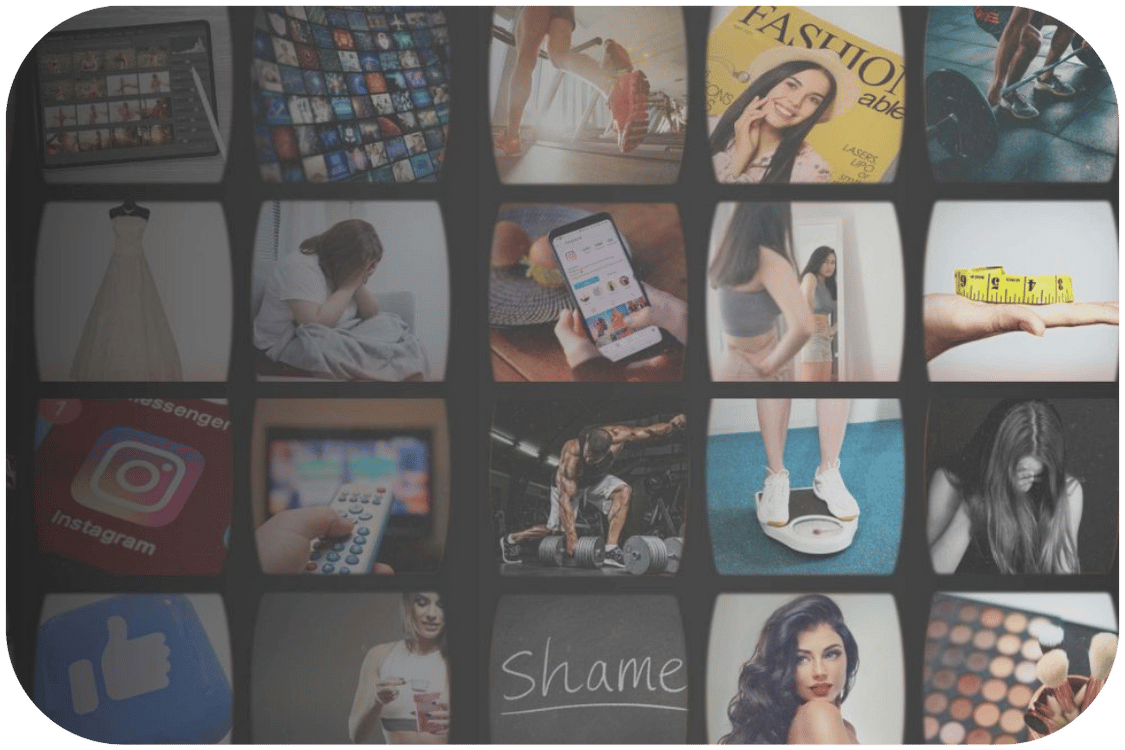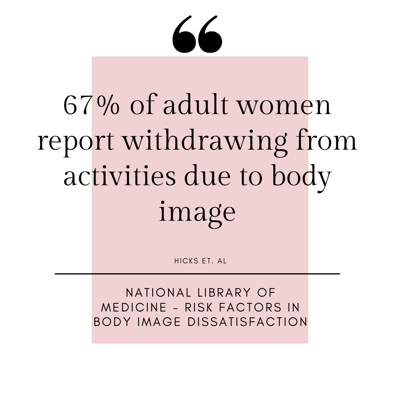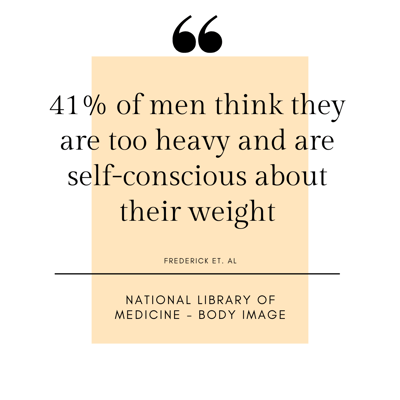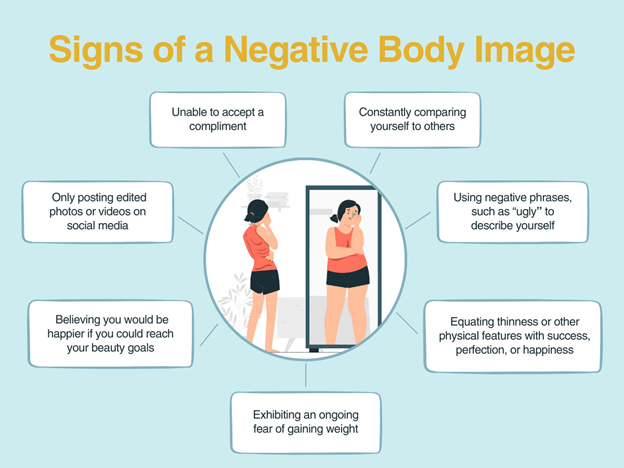Body Image Counselling
Quiet the inner critic, challenge harmful distortions, and rebuild a kinder relationship with yourself

Healing Body Image Through Counselling
Body Image Counselling for Kitchener Waterloo
It's no secret that our society makes it hard to accept our bodies. Relentless advertising, social media expectations, and messages from the people we love about how we're supposed to look, all affect how we think about ourselves. Body dissatisfaction is extremely high among both women and men, and it significantly impacts one’s quality of life.
But if you're one of the many people struggling with body image, you can heal from these negative thoughts. Body Image Counselling will help address the problem of body image at the source, understand the root of the issue and provide relief from negativity to see yourself in a more positive light.

What is Body Image

At its most basic level, body image is simply what a person thinks, feels, and believes about their body. However, it's also an important part of personal identity, so these simple facts become fraught with meaning, especially in a society that bombards us with harsh messages about bodies and how they affect our worth.
Body image involves an individual's thoughts about the size and shape of their body, their perceptions of how others see them, the actions taken to care for their body, and the methods used to monitor, alter, or conceal it. Body image, among other factors such as genetics and culture can also influence eating disorders. The feedback received from people in their social circle, the media, and social media plays a significant role in influencing these aspects.
Body image can be challenging for many people. Our culture often makes it difficult to develop a healthy relationship with our bodies, and negative messages can shape how we see ourselves from a young age.
While struggles with body image are common, it’s important to remember that you can take steps to build a more positive self-image.
Signs of Negative Body Image
- Using harsh or unkind words to describe yourself
- Comparing your appearance to others on a regular basis
- Finding it difficult to accept compliments about your body
- Feeling persistent worry or fear about gaining weight
- Linking your self-worth or happiness to achieving a certain look or weight
- Believing you’ll only feel satisfied or confident if you reach a specific appearance goal
- Sharing only filtered or edited photos of yourself on social media

Lets us Help you Find the Right Match
Right Therapist, Right Plan, Real Support
Whether it's a sudden shock or prolonged struggle, understanding your trauma with a therapist is the first step towards healing and reclaiming your life.
How Counselling Can Help With Body Image
The painful thoughts and emotions that come with a negative body image can feel inescapable. After all, your body is there for every part of your life, and persistent, damaging beliefs about it can colour your whole life.
But it is possible to make peace with your body. There are different therapeutic approaches you can use to help you see things differently, including supportive talk therapy, CBT, ACT, and EMDR Therapy. Here are some of the ways a therapist can help you free yourself from destructive messages and beliefs.

Counselling can help you reframe the beliefs that tell you your body is unworthy of acceptance and love. You can let go of shame about how you exist in the world and truly appreciate the body you live in
Examining Negative Messaging
The first messages we hear about our bodies come from our families. Parents and other relatives speak disparagingly about their own bodies, giving children a negative association with being overweight or different in any way. These messages can also be directed at children. It's not uncommon for family members to criticize the bodies of young children and warn them that there are consequences of not being vigilant about maintaining a certain appearance.
In therapy, with the help of your counsellor's outside perspective, you can take a closer look at the internalized messages you grew up with. Are they true? Are they helping you or hurting you? Parents often pass along the beliefs they grew up with, not intending to cause harm, but their experience doesn't mean you have to continue that cycle.
Challenging Distortions
Unrealistic images of bodies are nothing new. Ads and other media representations have long presented manipulated pictures, leading people to judge themselves by unattainable standards. But these days, those unrealistic images have invaded our lives in overwhelming numbers.
Social media sites swamp users with edited photos that make it look like everyone else has a perfect life and a perfect body. Especially for adolescents and young adults, this has been shown to have a negative impact on how they see themselves. In fact, research shows that simply reducing social media use significantly improves body image in this age group.
In therapy, you can come to understand the motivations behind these images. Businesses flood people with negative messages about how they look because it's an effective way to manipulate them to buy their products. Not only is it impossible for the average person to look like that, it's not even possible for the people in the pictures to look like that. Filters and photo editing create pictures that are literally unreal.
Therapy can help you change how you look at these images, and help you set up boundaries to protect you from the messages they promote.
Self-Acceptance & Compassion
A therapist can help you challenge the distortions in your thinking that make you believe that your appearance is unacceptable. There are many ways to think about our bodies and what is important about them. Learning to appreciate your body for what it does, how it works, and the sensory gifts it gives you is a powerful way to escape the message that your value lies in how you look.
Support Starts Here
You don’t have to face body image struggles on your own. At Trillium Counselling, our therapists are here to support you in building a healthier relationship with yourself
Why is Body Image Important?
Although people tend to assume that women are the ones who struggle with this issue, research shows that it's a significant problem for men as well. In developed countries, body dissatisfaction in children and adolescents is already astonishingly high. Studies vary, but it's between 35% and 85% among girls and 16% and 55% in boys.
This negative self-image is important because it can lead to a heightened awareness of perceived flaws, making people feel rejected because they believe others are judging them. It negatively impacts their mood, self-esteem, social functioning, and occupational functioning. It's also a significant contributor to the development of serious and sometimes life-threatening disorders, including anorexia, bulimia, and body dysmorphic disorder.
Individuals within the LGBTQIA+ community may encounter added challenges concerning body image. According to the NEDA, the onset of eating disorders in LGBTQ+ individuals may be shaped by factors like discrimination and bullying, discrepancies between an individual's body and their gender, encounters with violence and subsequent post-traumatic stress disorder (PTSD).
Supporting Your Journey to a Healthier Body Image
You don’t have to carry the weight of old beliefs or outside pressures. At Trillium Counselling, our caring therapists are here to support you on your journey to a healthier body image. Reach out to connect with us and start your path toward renewed self-confidence and well-being.
FAQs
Therapy works best when the 'fit' is right with your therapist. That’s why we carefully match you with someone whose expertise fits your needs and preferences. Building a strong therapeutic relationship is key to creating a supportive and effective experience.
Before meeting your therapist, you’ll complete a brief intake form. Your first 50‑minute session focuses on what brings you in, your goals, relevant history, and what success would look like. We’ll explain confidentiality and co‑create a plan so you know what comes next. It’s normal to feel nervous—your therapist will guide the pace.
The frequency of sessions depends on your needs and goals. Many people start with weekly or bi-weekly appointments and adjust as they make progress. The total number of sessions is unique to you—your therapist will work with you to find the right approach.
Our therapists understand that struggles with body image can feel overwhelming and deeply personal. Depending on your unique needs and goals, we may use approaches such as Cognitive Behavioural Therapy (CBT) to help challenge unhelpful thoughts, EMDR to process painful past experiences that affect how you see yourself, or Narrative Therapy to help reshape the story you hold about your body and worth.
We also draw on methods like Cognitive Processing Therapy (CPT) and Compassion-Focused Therapy (CFT) to reduce shame, build self-acceptance, and strengthen your resilience. Each approach is tailored to you, creating a safe, supportive space where you can heal your relationship with yourself and move toward greater confidence and peace.
Most of our services are covered by extended health benefit plans. Coverage varies with every plan, so please check your specific plan or contact your provider to confirm your benefits.
Most employer benefits cover therapy with a Registered Social Worker (MSW, RSW) or a Registered Psychotherapist (RP). We can direct bill to most major insurers when your plan allows it; otherwise, we email insurance‑ready receipts after your session.

Last Reviewed Aug 5 2025 by Katelyn Regier
Katelyn is a Registered Social Worker with the Ontario College of Social Workers and Social Service Workers (OCSWSSW). She holds a Master of Social Work Degree from Wilfrid Laurier University, and a Bachelor of Arts Degree (Hons) in Criminal Justice & Public Policy from the University of Guelph. Katelyn’s work and passion is centered around creating a safe space where you can feel supported and not alone in your healing journey. Everyone’s path to recovery looks different, and it is Katelyn’s goal to walk with you as you discover what this path looks like for you.
Not sure yet? Let’s talk it through.
If you’d like to ask questions or explore your options first, book a free 20-minute matching consult or give us a call (226-752-8857) . One of our team members will help you find the right therapist and next steps that feel comfortable for you.
%20(1).png?width=200&height=80&name=Trillium%20Counselling%20Logo%20(999%20x%20398%20px)%20(1).png)

















